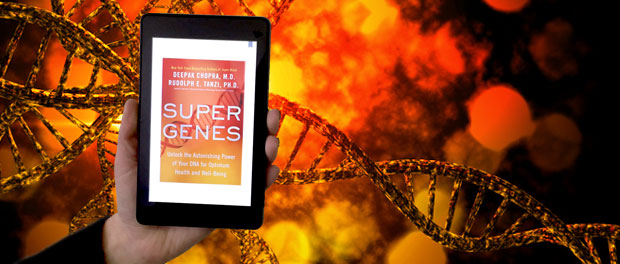
Change your genes, change your life. Seems like a radical idea, especially since we’ve been taught to believe that our genes are set in stone when we are born. Not so, according to the authors of Super Genes, Deepak Chopra, M.D. and Rudolph Tanzi, Ph.D. It seems that we are not at the mercy of our genes, rather we are the “user and controller” of them. And, through simple lifestyle changes, we may be able to modify our gene activity and ultimately improve our overall health and well-being.
This self-help book, a New York Times bestseller that debuted in November, presents an epigenetically oriented view on self-care that extends beyond our common perception of biology as destiny. Coauthors Chopra, founder of the Chopra Center for Wellbeing and author of numerous books on alternative medicine, and Tanzi, Professor of Neurology at Harvard University and Director of the Genetics and Aging Research Unit at Massachusetts General Hospital, put the science of epigenetics at the center of this book, providing an easy-to-understand explanation of the mechanisms behind gene activity and how the environment and perhaps consciousness can affect our biological processes.
Epigenetics, which literally means “above” or “on top of” genetics, refers to the external modifications that are made to DNA which can turn genes on or off. First proposed by English biologist Conrad Waddington in the 1950s, it took decades before the existence of an epigenome was even considered. Now gaining popularity among scientists, the study of epigenetics is at the forefront of modern science. In fact, the authors refer to epigenetics as the “new genetics” since it has revolutionized our understanding of the structure and behavior of all biological life.
In Super Genes, the authors reference many familiar epigenetic studies, including the Dutch hunger famine, Holocaust survivor children, and even the rat pup licking study. Drawing on these studies and other research, they suggest that our actions and behaviors, if they occur often enough, can affect how genes are expressed and packaged, thus leading to how our bodies develop and react. As they write in their book, “Your genes are fluid, dynamic and responsive to everything you think and do.”
Studies have shown that conditions such as diabetes, allergies, Alzheimer’s, as well as inflammation, and more are associated with gene activity and can potentially be altered. This notion, combined with a guidebook for self-improvement, gives hope to anyone looking to improve their health status and live longer. Nevertheless, the book does have critics in the scientific community who have reported that there is no direct evidence that humans can change their genes permanently through lifestyle changes. As noted in our previous article on such opposing views, the science of epigenetics is still in its infancy and much more research is needed to support certain claims.
Whether or not you agree with Chopra and Tanzi, their book does offer up sensible advice for a healthier life, even without considering their proposed connections to the science of epigenetics. By making better choices (and there are plenty of suggestions in the book), the authors say you can achieve the following:
- Improve your mood level, warding off anxiety and depression
- Resist colds and flu
- Restore normal sound sleep
- Increase energy level and reduce chronic stress
- Be relieved of persistent aches and pains, and a wide range of discomforts
- Slow the aging process or potentially reverse it
- Gain a regular metabolism to lose weight and keep it off
- Decrease your risk of cancer
The book is split up into three separate sections. The first part explains the science behind their views. This is where they discuss DNA, genes and epigenetics, as well as the microbiome (the community of microorganisms that live in our bodies). The second part is about lifestyle choices and how making simple, positive changes can potentially benefit our genes. The third part incorporates mind and consciousness into the genetic equation and reiterates the lessons from the first two parts. Most people will likely find the second part very useful as it divides the chapters up into six categories covering diet, stress, exercise, meditation, sleep, and emotions. Offering up a menu of choices ranging from easy to more experimental, this chapter is a great reference guide to use on the road to self-improvement.
Overall, I would say the book is definitely worth reading. Not only was it well written and easy to understand, it was motivating and practical. According to the authors, anyone can change for the better; nothing, not even our DNA, should hold us back from good health, happiness and a longer life. Deepak and Tanzi keep it simple. They suggest we make a few changes in each suggested area, ones that we will keep, and then add more changes as we go along. Soon, our improved lifestyle may be as natural to us as our old ways were, and in time we should feel better and be more active. When you read the book, you will see how they connect lifestyle, health and epigenetics, providing you with substantial content to let you determine for yourself if their ideas make sense and if their practices are worth trying. Plus, they use plenty of examples and analogies to explain the science of epigenetics, which can be helpful to anyone unfamiliar with this subject or interested in learning about it.
It should be noted that as insightful and thought provoking as this book is, the authors admit that there isn’t enough epigenetic evidence in humans, yet (mostly animal studies). But they firmly believe that the association between our actions and our genes exists. More research is needed and hopefully this book will encourage that, or at least increase the general public’s awareness of epigenetics. The reader must keep in mind that this is a “self-help” book with good advice geared for the general public rather than a scientific audience, and that we are only just beginning to fully understand the mysteries of epigenetics.


